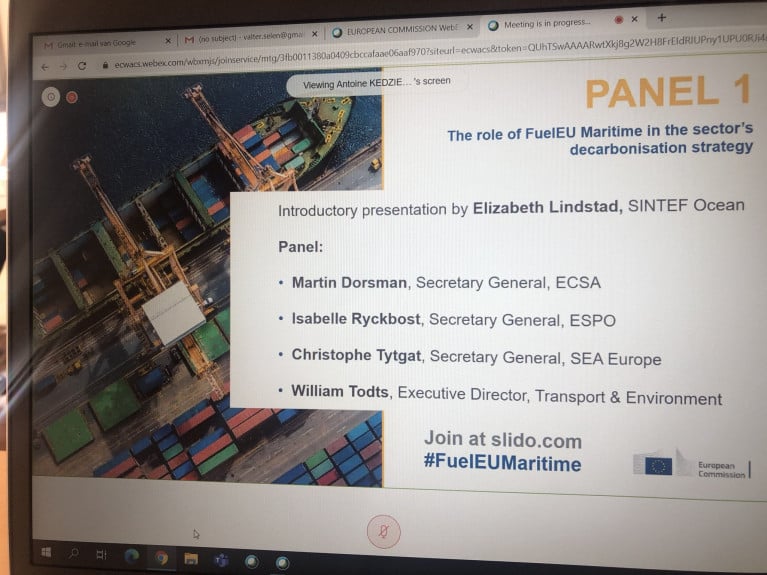Displaying items by tag: Decarbonise Shipping
ESPO Calls for FuelEU Maritime that Clearly Sets Out Innovation & Investments in Maritime Sector
Ongoing discussions on the future of FuelEU Maritime Initiative has led the European Sea Ports Organisation (ESPO) to express the commitment of European ports is to play their part in helping the shipping sector decarbonise.
The full ESPO position on the FuelEU Maritime Initiative is available here.
ESPO welcomes Europe’s ambition to be the world’s first net zero emission area by 2050 and believes that the greening of shipping is a priority to deliver on this ambition. It is time to act. Enhancing both the development, uptake, use, and availability of sustainable alternative fuels and technologies is crucial to curb the rising CO2 emissions from shipping.
For Europe’s ports, the best and most effective way forward is a policy which combines clear goals with measures facilitating the uptake of a variety of clean fuels and technologies, overcoming the barriers to the use of sustainable alternative fuels and supporting investments on both the demand and the supply side.
Since there is currently no silver bullet to reduce shipping emissions, Europe’s ports believe that a goal-based and technology-neutral approach is best placed to facilitate the deployment of promising potential technologies and allow for innovation as part of a multifuel future.
To facilitate this approach, ESPO calls for the creation of bottom-up coalitions and framework agreements between all relevant stakeholders in the maritime sector. Relying on a supporting policy framework at the European level, such coalitions would ensure that the alternative fuels infrastructure available in ports is effectively used and that the demand for alternative fuels infrastructure matches the supply. The approach would help achieve economies of scale and overcome potential hurdles to the deployment of alternative fuels infrastructure, which include uncertain demand, high initial investment costs, and slow and uncertain return on investment.
The FuelEU Maritime Initiative will have direct implications for alternative fuel infrastructures and must therefore be compatible and well-aligned with existing legislation, specifically the Alternative Fuels Infrastructure Directive. It will require targeted and effective investments in ports. Individual roadmaps at port level are an important tool for ports to assess what is needed and effective in terms of investments, taking into account the diversity of shipping segments and particular circumstances of the port. Coordinated approaches and solutions between stakeholders at port level and between ports must be stimulated.
The FuelEU maritime initiative should address all ship emissions, both during navigation and at berth. ESPO supports a specific emission reduction target at berth as complementary to the overall emission reduction standard, but this cannot be a way to delay action, or compensate for lacking emission reductions during navigation.
European legislation, including the FuelEU Maritime Initiative, must provide the appropriate financial support to enable the greening of the maritime sector. This must happen through dedicated funds under new and existing instruments for investments in clean fuel infrastructure for shipping, the creation of clean energy hubs in port areas, and clean energy grid connectivity. To further incentivise the use of clean fuels, the review of the Energy Taxation Directive must provide for a permanent and EU-wide tax exemption for all clean fuels and clean sources of energy. Finally, the deployment and use of infrastructures could also be encouraged using revenues generated by forthcoming market-based measures for shipping.
“We welcome the Green Deal ambitions and the proposed EU-wide target of reducing greenhouse gas emissions by at least 55% by 2030. Even if the maritime sector is one of the most energy-efficient modes of transport, this ambitious target will require the shipping sector to take urgent action now in order to significantly reduce emissions. It is now important to find the most effective ways to deliver on these ambitions. There is no time to waste, and given the current economic circumstances, there is no money to waste. We cannot go for investments that simply tick arbitrary boxes through prescriptive goals without ensuring the use and uptake of sustainable alternative fuels. Such an approach will not deliver in terms of emission reductions of the shipping sector. We therefore favour an approach which combines clear goals with a supportive policy for the most promising technologies, which would avoid the risk of creating stranding assets. Such a goal-based approach will provide the basis for bottom-up coalitions between stakeholders. We see such a framework as the best guarantee for delivering the decarbonisation of the maritime sector” comments Isabelle Ryckbost, Secretary General ESPO.
The full ESPO position on the FuelEU Maritime Initiative is available here.






























































